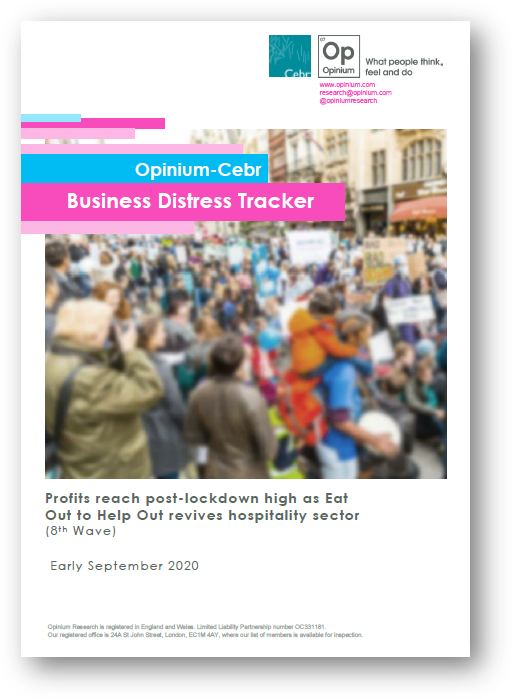Profits reach post-lockdown high as Eat Out to Help Out scheme revives hospitality sector

The most recent instalment of the Opinium-Cebr Business Distress Tracker uncovers some promising signs for the UK economy, especially from an employee perspective as fewer workers are currently furloughed. There are also indications that businesses are slowly returning to pre-coronavirus norms, with fewer companies requiring adjustments due to the global pandemic. Despite this, however, the proportion of workers facing reduced hours and/or reduced pay is largely unchanged, as most businesses remain extremely cautious due to the growing concerns of a second wave sending the country back into lockdown and the economy into an even deeper recession.
The Eat Out to Help Out scheme delivered a major and much needed boost to the hospitality sector in August. Although profitability in this sector was 36% lower as a result of the coronavirus pandemic in the latest wave of the Opinium-Cebr Business Distress Tracker, this is a dramatic improvement on the 59% reduction in profits recorded in mid-July.
The latest wave of the Business Distress Tracker also points to a more general uptick in activity in August. Indeed, businesses’ profits were down by 21% in August as a result of the coronavirus pandemic. This is a significant improvement on the 26% reduction in mid-July and marks considerable progress relative to the middle of April, when profits were down by 29%.
The increase in profits has fed through into business sentiment. 39% of companies described current trading conditions as good in the latest wave of the tracker. This is up from 34% in the previous wave.
One-fifth (21%) of businesses have now returned to pre-lockdown levels of production, as the economic recovery gathers pace. However, twice this share of businesses (41%) say they are least 6 months away from reaching pre-lockdown levels of production, highlighting that we are still in the relatively early stages of the recovery.
See the full report here:




